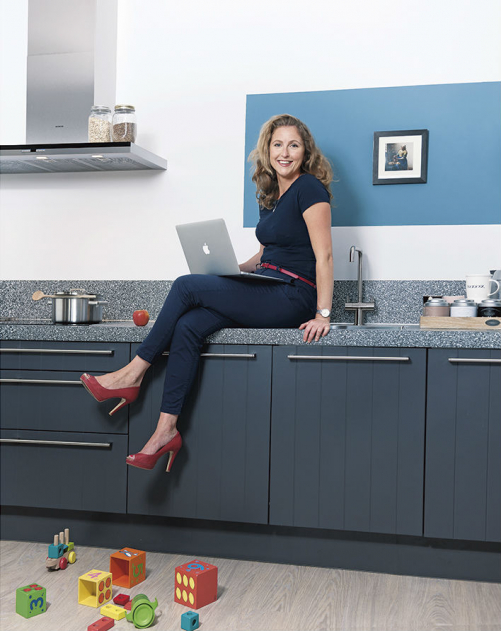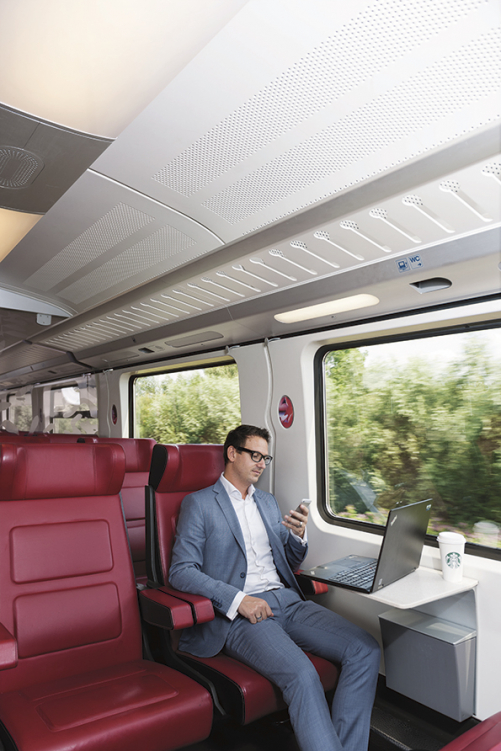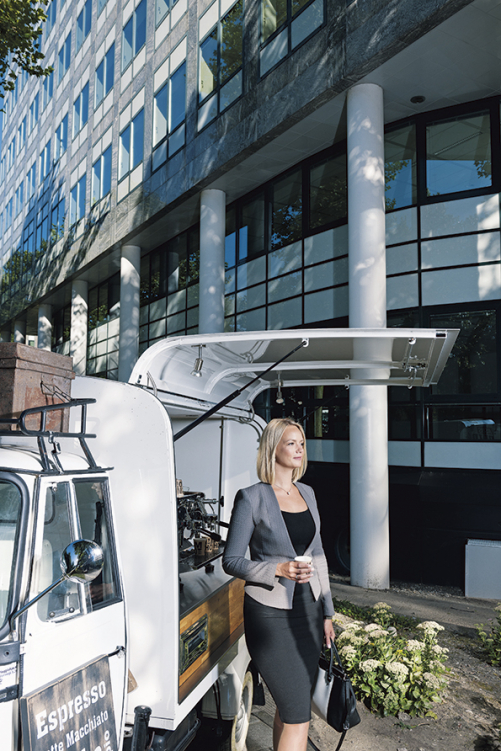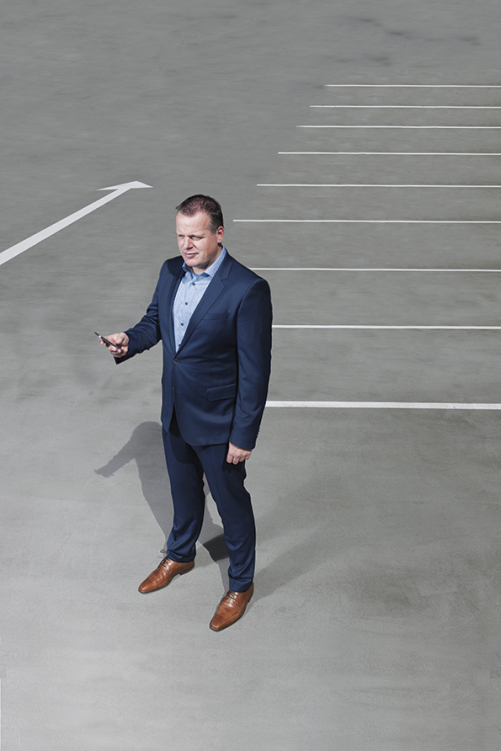
Revitalising the Workplace
The transformation of the workplace is not a seamless transition, especially within traditional organisations where it translates not only into a shift in furniture but also a change of mindset. ‘As an accountant, for instance, you have a higher than average tendency towards conservatism,’ Egon de Prouw, director at Mazars in the Netherlands, admits.
Beyond practical project management aspects, the ‘mindset factor’ was indeed one – if not the most important – of the many challenges that Mazars had to face when considering the relocation of the head office of its Netherlands branch in Rotterdam. Mazars’ ambition has been made quite clear by its leadership: staying true to its founding fathers’ values(1), the firm thrives on cultural, intellectual, professional and personal diversity. It aims not only at promoting local and global economic and social development, hence creating shared value; but also, as a sustainable firm, at creating value on the long term; and finally, as a tribute to the concept of stewardship, at passing this value on to future generations. Only then can a business such as Mazars be deemed to be both future-proof and a modern firm. At the core of the project lies this question: how to substantiate these – quite ambitious – claims when relocating a 275-people office in one of Europe’s economic capitals? Walking the talk of such principles may prove in reality not just to be plain sailing, as Erik van der Eijk, financial controller, recalls: ‘As I was telling my friends that my company was in the process of not only relocating but also reinventing our way to work, I figured out not everyone was excited, as some of them actually went through difficult experiences’. Companies willing to embrace this transformational trend need to operate with a holistic approach, as it has an impact on every function, from office management to human resources to finance.
As stated by Joyce van Vliet, senior tax adviser, ‘moving to new premises is a complete cultural change programme,’ highlighting the fact that the challenge may seem daunting at first, but also that change takes time. Assuming that ‘people do not easily change on their own,’ de Prouw stresses the importance of ‘making change attractive.’ Indeed, saying that change requires an effort is not an overstatement: change is a bet on the future, and it comes with both financial and social costs.
Antonet Lajqi | Egon de Prouw |
Walking the Talk of Sustainability
Sustainability is a concept that has become increasingly popular over the last years. As stated in the United Nations Brundtland report, ‘development that meets the needs of the present without compromising the needs of future generations to meet their own needs’ arose as one of the most significant challenges that mankind will face in this century(2).
Technology, government incentives, and financial investment enabled our buildings and cities to go ‘smart,’ thus making citizens’ lives easier and their carbon footprint lower. The private sector quickly understood the issues at stake, resulting in more and more corporations striving to become sustainable champions. As stakeholders demand transparency and commitment, companies can no longer settle for meaningless declarations of intent and ‘greenwashing’ statements.
A report(3) from the non-profit ‘Alliance to Save Energy’ pointed out that 2.8 billion USD are wasted annually due to computers not being shut down at night. In the French business district of La Défense near Paris, light pollution is raising concern: it’s estimated that EUR 75,000 are being squandered in energy bills every month because of corporations’ carelessness in this matter. The Exaltis tower, home to Mazars’ Group headquarters, is, however, one notable exception: following an investment of EUR 30,000(4) – an amount equivalent to one year’s power consumption – the building is equipped with motion sensors that automatically switch the lights on and off, as needed. Even though investing in such technology may seem burdensome, the return on investment always makes it a profitable expense for any organisation willing to walk the talk of environmental protection and sustainability. As Antonet Lajqi, HR consultant, puts it, ‘you cannot say you want to be sustainable – you have to be it!’
Mazars’ choice for new offices in Rotterdam is meant to fit this ambition, opting for an existing building that has been transformed into an innovative office, as climate-neutral as possible. Due to its location, the office will also have excellent connections to the public transportation system. ‘Accessibility, sustainability, and cost efficiency were key selection criteria for our new office,’ Remco Schoonderwoerd, a partner and one of the project leaders, points out. What’s more, ‘having cost-effective facilities enables us to invest more in quality, innovation and people, which ultimately benefit our employees, clients, and stakeholders as a whole.’ Well-being in the workplace is much more than a buzzword. One study shows that absenteeism related to illness dropped off by 6.5 percent with better office daylighting(5). Research confirms that the physical work environment affects employees’ well-being and, as a matter of consequence, their productivity(6). Located in the lively area of Alexandrium where it is expected to blend into, and form an integral part of the neighbourhood, the new Mazars’ Rotterdam office is designed with an emphasis on interior layout and space arrangement to make working days as pleasant as possible.
The paperless policy that is being implemented at the new Mazars’ office in Rotterdam is one practical application of sustainability in the workplace. On the other hand, with the Software as a Service (SaaS) model becoming the norm, an increasing number of companies – including large caps(7) – are also changing their IT solutions management approach and often hosting their data in the cloud, making it accessible for both their internal and external clients anytime, anywhere, on any device the (ATAWAD model). Associated with offices that are well-connected to public transports, a paperless policy enables work to be done on the go, ‘making people more agile and travelling time more efficient’ according to Schoonderwoerd. ‘A new approach to work is key to maintain a proper work-life balance’, van der Eijk adds.
Joyce van Vliet | Remco Schoonderwoerd |
Inventing New Ways to Work
New ways to interact and work together are also being witnessed in the workplace itself. In the Netherlands, Mazars took the opportunity of the relocation of its Rotterdam premises to lay the groundwork for a new collaboration model. The new Mazars premises are spread over fewer floors and workspaces are allocated according to the employees’ activity. In this configuration, partners are given the very same work conditions as other staff members.
This disruptive, open and more agile concept, called ‘Mazars2B’, aims at fostering cooperation and transparency between employees regardless of their seniority or the department they work in. Joyce van Vliet, senior tax adviser, agrees with de Prouw on the fact that this new flexible arrangement, with ‘more open spaces and fewer boundaries between departments’ should ‘make it easier to consult your colleagues outside your team.’ Still, many hurdles lie in the way to make the venture fully successful. With an increased effort on internal communications, additional feedback is expected to be received from the teams during and after the relocation process, due to be finalised at the end of 2016. This feedback should prove to be extremely valuable as the Rotterdam relocation programme is designed to be the blueprint for all Mazars office moves in the Netherlands in the future.
(1) ‘Robert Mazars, 1920-2015: a tribute to the pioneer’ in Creating Shared Value – Mazars Yearbook 2015. http://annualreport.mazars.com
(2) http://www.un-documents.net/our-common-future.pdf?
(3) http://link.springer.com/chapter/10.1007/978-3-642-37157-8_30#page-1?
(4) http://www.francetvinfo.fr/economie/bureaux-eteignez-les-lumieres_1830807.html
(5)http://www.usgbc.org/sites/default/files/OR10_Daylighting%20Bias%20and%20Biophilia.pdf?
(6)http://www.worldgbc.org/files/6314/1152/0821/WorldGBC__Health_Wellbeing__productivity_Full_Report.pdf (7) http://fortune.com/2016/07/19/big-companies-many-clouds/
Want to know more?





